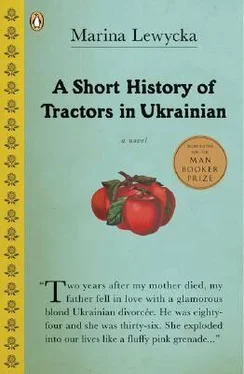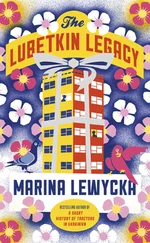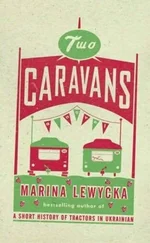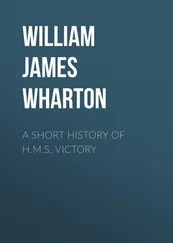I held the phone away from my ear and let her rabbit on.
The next day he phoned me to describe Big Sister’s visit.
“When I saw the car pulling into driveway and I saw her getting out and walking towards the house, can you imagine, Nadezhda, I performed involuntary excretion in my trousers.” He said it as though his bowels were not part of him but a discrete force of nature. “You see, this Vera, she is terrible autocrat. Tyrant. Like Stalin. She is always pestering me. Must do this, must do that. Why must I always do as I’m told? Can I not make up my mind about something? Now she says I must have sheltered housing. I cannot afford sheltered housing. Too expensive for me. Better I stay here. Live here. Die here. You tell her I said so. Tell her I want her to visit me no more. You and Michael can visit.”
When Mike and I next visit, we find the house and garden much as my sister described. A thin veil of dust has greyed all the white paintwork and clings to cobwebs on the ceiling. The sitting-room is full of windfall apples collected from the ground and laid out in shallow boxes and cartons on the table, chairs, sideboard and even on top of the wardrobe, filling the house with their fruity over-ripe smell. Fruit-flies hover over the Grieves and Beauty of Bath apples which, being softer, have already started to turn brown and bubble up in specks of mould that my father is too short-sighted to notice. He sits at one end of the table with his little knife, peeling, slicing and sorting them into Toshiba-sized piles. I notice how much better he himself is looking.
“Hallo! Hallo!” he greets us warmly. “Well, nothing new to report. Excellent apples! Look!” He offers us a dish of the sticky Toshiba-cooked mixture. “Today we must go to library. I have ordered some books. I am becoming very interested in this business of an engineering Weltanschauung as in ideology incorporated into design of new machines.”
Mike looks impressed. I raise my eyes to the ceiling. My father ploughs on, furrowing up trails of gleaming brown ideas.
“You see as Marx said himself, the relations of production are embedded in the machinery of production. Take for example the tractor. In nineteenth century, early tractors were made by the individual craftsman in his workshop. Now they are produced on assembly lines, and at the end of assembly line stands man with stopwatch. He measures the process.” (The accent is on the second syllable-“pro-cm’.) To make more efficiency the worker must work harder. Now look at a man who ploughs in the field. He sits alone in cab. He moves levers and the tractor ploughs. He follows the gradient of terrain, he takes account of soil and weather. He believes he is master of the process . But at the end of the field stands another man with stopwatch. He observes the tractor driver, makes note of his lines and turns. So certain time is allotted for the ploughing of a field, and man’s wages fixed accordingly. Now, you see, in this era of computerised numerical control, even the man with stopwatch will be redundant, and stopwatch itself will be incorporated into dashboard equipment.”
He flourishes the little knife with manic energy. Curls of apple peel slide off the table on to the carpet, where they are trodden into a fragrant mush.
“It’s the testosterone surge,” says Mike as we follow my father through the busy Saturday morning streets of Peterborough. “Look, his back’s straightened up, his arthritis is better. We can hardly keep up with him.”
It is true. My father is racing ahead of us, darting and dodging through the crowd with single-minded intent. He is heading for the public library to pick up his books. He walks in a kind of rapid shuffle, bending forward from the hips, hands at his sides, head stretched out in front, jaw set, peering straight ahead.
“Oh, you men are all the same. You think sex is the cure for everything.”
“It cures quite a lot of things.”
“It’s funny, but when I talk about this business of my father and Valentina with my women friends, they’re absolutely appalled. They see a vulnerable old man who’s being exploited. Yet all the men I talk to-without any exception, Mike” (I wag my finger) “they respond with these wry knowing smiles, these little admiring chuckles. Oh, what a lad he is. What an achievement, pulling this much younger bird. Best of luck to him. Let him have his bit of fun.”
“You must admit, it’s done him good.”
“I don’t admit anything.”
(It’s much less satisfying arguing with Mike than with Vera or Pappa. He’s always so irritatingly reasonable.)
“Are you sure you’re not just being a bit puritanical?”
“Of course I’m not!” (So what if I am?) “It’s because he’s my father-I just want him to be grown up.”
“He is being grown up, in his way.”
“No he’s not, he’s being a lad. An eighty-four-year-old lad. You’re all being lads together. Wink wink. Nudge nudge. What a great pair of knockers. For goodness’ sake!” My voice has risen to a shriek.
“But you can see it’s doing him good, this new relationship. It’s breathed new life into him. Just goes to show that you’re never too old for love.”
“You mean for sex.”
“Well, maybe that as well. Your Dad is just hoping to fulfil every man’s dream-to lie in the arms of a beautiful younger woman.”
“ Every man’s dream?”
That night Mike and I sleep in separate beds.
My father has ordered from the library several biographies of nineteenth-century engineers: John Fowler, David Greig, Charles Burrell, the Fisken brothers. Encouraged by Valentina’s husband, the intelligent-type polytechnic director, he has started to research and write his great work: A Short History of Tractors in Ukrainian .
The first tractor was invented by a certain John Fowler, a Quaker, an intelligent and abstemious type. No vodka, beer, wine, not even tea crossed his lips, and for this reason his brain was extraordinarily clear. Some people may describe him as a genius .
Fowler was a good man, who saw in the tractor a means to emancipate the labouring masses from their life of mindless toil, and bring them to an appreciation of the spiritual life. He worked night and day to perfect his plans .
He writes in Ukrainian then translates it painstakingly into English (he studied English and German at high school) for Mike’s benefit. I am surprised how good his written English is, though sometimes I have to help him with the translation.
The first tractor, which Fowler invented, was not strictly speaking a tractor at all, since it did not drag a plough. Nevertheless, it was an engine of amazing ingenuity. Fowler’s tractor consisted of two engines positioned on opposite sides of the field, and connected by a looped cable, and to the cable were fixed the blades of a plough. As the engines turned, so the cable pulled the plough up and down the field, up and down. Up and down .
My father’s voice drones up and down like a contented harvest bumble-bee. The room is warm and full of harvest smells. Outside the window, a purplish twilight is settling over the fields. A tractor is moving slowly up and down, already turning the burned-off stubble into the ground.
Despite Vera’s and my efforts, Valentina and her son Stanislav came back to England on 1 March. They entered at Ramsgate, on six-month tourist visas. No one at the British Embassy in Kiev objected to their visa; no one at Ramsgate gave their passports more than a cursory examination. Once back in Peterborough, they moved in with Bob Turner. Valentina took a job at a hotel near the cathedral, and immediately went ahead with plans for the marriage to my father. This much I managed to piece together from hours of telephone conversations.
Читать дальше












